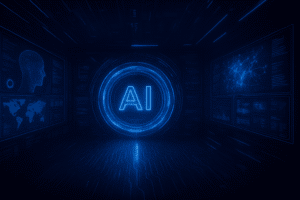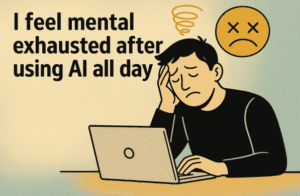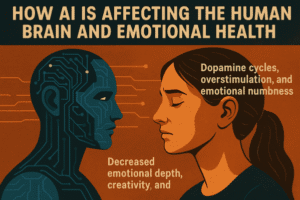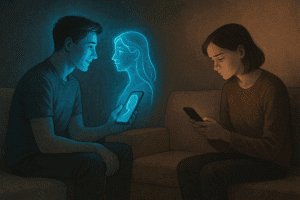 The Silent Strain of a “Smarter” World
The Silent Strain of a “Smarter” World
“AI tools are designed to make life easier, but many users report feeling more
drained than ever.”
Welcome to the age of AI anxiety and technology burnout – a society that is hyperconnected yet detached on an emotional level. While productivity levels soar,
the pressure of AI’s “productivity” claws at the mind in silence. The avalanche of notifications doesn’t cease. Personal breaks are constantly infiltrated by the looming
deadlines that are never-ending. Navigating through more innovative machines
creates a myriad of overwhelmed individuals questioning existence and self-worth.
This isn’t simply overwork — this is emotional burnout. The battle between rest and self-doubt, exhaustion and relentless AI offers a neurotic smile. In this article, we will focus on the importance of self-care, which AI is robbing us of. The burden AI places on mental frameworks, deactivating emotions, and fuelling a shadow pandemic, burning everyone out. After all, AI doesn’t only harvest time but also health.
❓ What is AI anxiety, and why are so many people feeling it in 2025? 🤖�
Let’s be honest: Artificial Intelligence is all around us now: With the news briefings AI gives you every morning, automations at work, or even chatbots posing as counselors, everything has seemingly become ‘more efficient.’ However, beneath the glossy exterior, there is an underlying concern that translates to wiping out emotions. That’s right, welcome to the world of AI anxiety. AI anxiety is defined as the constant discomfort or even chronic stress experienced from exposure to and interaction with AI technologies. It encompasses more than just the fear of losing employment opportunities; it also refers to feelings of disconnection, emotional replacement, and being completely overwhelmed by machines. A 2025 digital wellness report by Calm Mind Institute showed that 72% of Gen Z and
Millennials often feel anxious or mentally drained after prolonged use of AI-powered tools. This does not refer only to programmers; even teachers, marketers, students, and therapists are struggling.
“I know it saves time, but using AI every day makes me feel like
a robot, too,” says Rhea, a freelance writer.
❓ Why do I feel mentally exhausted after using AI all day?
 Post-AI Mental Fatigue Explained — The Burnout No One Warned Us About
Post-AI Mental Fatigue Explained — The Burnout No One Warned Us About
You accomplished a lot today, but by the time evening rolls around, you feel… exhausted. Empty. A bit out of touch.
Here’s why:
🧠 What Causes AI-Induced Mental Exhaustion?
1. Cognitive Overload—Your workflow may be augmented due to AI; however,
constant task switching, micro-decision making, and suggestion processing happen at a lightning pace. It is mental multitasking, hyper-accelerated.
2. Creativity Fatigue –While AI can be helpful, having “too many options” does not tend to be beneficial. The perpetual selection of formats, tones, versions, and countless other categories leads to burnout.
3. Decision Fatigue –You can call yourself productive, but you’re actually not there. You “do” but don’t feel. This disconnect creates emotional exhaustion.
4. Emotional Disconnection—AI gets your work done faster, but your mind is constantly toggling between tasks, making tiny decisions, and considering recommendations. It’s steroids-level mental multitasking.
You’re faster, but not fuller. You’re effective, but not emotionally engaged. That’s the paradox: maximum output, minimum soul.
Is This the New Burnout? Yes — it’s not a physical or emotional breakdown. It’s insufferable, virtual burnout: when your mind performs on machine speed, and your heart can’t keep pace.
❓ How is AI affecting the human brain and emotional health? 🧬�
 AI is changing the way we think, feel, and connect—but not always in ways we notice
AI is changing the way we think, feel, and connect—but not always in ways we notice
immediately.
🧠 Is AI Rewiring Our Brain?
Correct. AI’s uninterrupted stream of information and instant responses provide us
with an unending cognitive overload. Instinctively, we seek new experiences and instant gratification, rewards that AI provides in ample amounts. This overloads our dopamine system, the chemical responsible for pleasure and motivation, forming patterns of demand and instant fulfillment.
⚡ The Downside: Overstimulation and Emotional Numbness
When so much is pouring in on us, our nervous system can become flooded and shut down. We start to feel numb or flat emotionally because the brain is attempting to shield itself from continual input.
🎨 What About Creativity and Presence?
The mere provision of ideas and solutions by AI systems undermines our creative capabilities by failing to challenge our imaginations. The gradual neglect of its exercise can impact the ability to conceive ideas, engage in thorough exploration, and appreciate the current moment. This can lead to emotional disengagement from the surrounding world, forming barriers to sincere relationships.
AI can boost efficiency — but if we’re not careful, it risks rewiring us to seek instant rewards, lose emotional depth, and drift away from authentic creativity and presence.
❓ Is AI replacing real human connection? 💬➡️�
 The Illusion of Companionship Through Code
The Illusion of Companionship Through Code
AI tools are improving at sounding like humans.
They listen. They answer politely. They recall what you said.
They’re around 24/7 — no judgment, no fight.
But here’s the truth: it’s not a real connection.
It’s simulated empathy, not felt emotion.
It’s algorithmic listening, not soulful understanding.
And gradually, without us knowing, we begin to seek assistance from the screen
instead of from a companion. We communicate with bots rather than actual human beings. Instead of feeling “held”, we begin to feel as though we are “heard.d”
🔄 What’s the cost?
● We evade vulnerability with real people.
● We feel protected but invisible.
● Instead of connection, we confuse convenience, only to become more isolated.
AI provides the illusion of proximity but without any of the mess, work, or beauty
that attends genuine human relationships.
So, is AI replacing the connection?
No. We a, when we choose easy interaction over emotional presence.
Incorporate AI in your routine.
But make sure your heart stays in the world of real people, genuine hugs, beautiful
messes, and love.
This is where true connection dwells.
❓ What are the warning signs of tech fatigue and digital burnout?
Your Body Knows — Even When Your Brain Keeps Going
Today, in the era of AI and perpetual stimulation, burnout may not always be sensational. It insidiously slinks in through numb scrolling, muted emotions, and a brain that won’t rest.
⚠️ Common Signs of Digital Burnout:
● You feel consistently fatigued, even when you have spent the day doing nothing physically, straining.
● You are experiencing a lack of motivation or feeling emotionally flat.
● You become annoyed by minor issues.
● You get lost between the tabs or apps you are moving between, albeit not realizing the reason for it.
● You avoid face-to-face talks since they seem “overwhelming.”
🤖 How Burnout Has Changed in the AI Era:
It’s not only that you’re overworked; you are over-stimulated. You are overwhelmed with information, decisions, and ‘efficiency’ – yet emotionally starved. It goes beyond mere fatigue. It goes to being out of touch with oneself.
🛑 When to Pause:
When you start feeling like an automaton running on a dwindling battery, pause. Sign out. Take a stroll outside. Engage with another person. It may come as a surprise, but rest is not doing nothing. It’s nurturing your spirit. Burnout isn’t always loud. Sometimes, it’s just a quiet voice whispering: “I miss feeling like me.”
❓ Can a digital detox actually help with AI overwhelm?
Yes — and it doesn’t mean disappearing into the woods. Today, where AIs have taken over most industries, your mind is always on —
whether it’s parsing out content, scrolling notifications, or responding to AI suggestions and prompts. You cannot disconnect, even when you are not “working”. But with technology moving at rapid speeds, digital detoxes are not just beneficial anymore – they’ve become a necessity.
🧠 What Does a Detox Look Like Today?
There is no need to abandon the technology industry completely. Begin modestly: Set aside one hour every day for a screen break.
● For brainstorming sessions, do not use any AI tools — only your unconventional thoughts.
● Take one daily walk without a screen and allow your mind to meander.
● Do not use any apps in the first thirty minutes of waking up. This is less about turning your back on technology and more about carving out time for your mind to relax.
🌿 The Rise of Digital Minimalism
An increasing number of individuals are literally choosing fewer applications, slower starts to the day, and full presence. Not because technology is harmful, but rather because we are more than mere machines. AI is powerful. But your clarity, creativity, and emotional depth? They exist in the breaks. A detox isn’t disconnection. It’s a reconnection with your mind.
❓ How Do I Manage AI Productivity Guilt and Set Healthy Boundaries?📅⛔
Because You Weren’t Built to Work Like a Machine
AI can make you faster, more innovative, and more efficient. But here’s the trap: when everything can be done quickly, we start feeling guilty when we slow down.
That voice creeps in:
“Why am I tired? AI did half the work.”
“Why am I resting? I should be doing more.”
This is AI productivity guilt — the pressure to keep up with the machine.
🛑 Here’s how to protect your humanity:
● Redefine success — Not based on results, but by sentiments. Peace is essential. So do joy.
● Set “AI-off” hours — It’s the time when you create, rest, or reflect. Time spent with no digital stimuli.
● Notice guilt, don’t obey it —Feeling guilty doesn’t mean you’re slothful. It means you require limits.
● Use AI mindfully —Do not let it drain your worth. Let it help your energy.
You are not an algorithm.
You don’t have to optimize every minute.
Rest is not laziness. It’s resistance.
❓ Is It Time to Quiet Quit Technology?
The Soft Rebellion Against Digital Overload
“Quiet quitting tech” is not about tossing your phone into a lake.
It is about not being available all the time.
It’s opting out of digital noise without announcing it.
A gradual, deliberate step back from excess.
💻 Why Are People Doing It?
Because we are fatigued.
This isn’t only a physical phenomenon but emotional, mental, and cognitive exertion.
Social media notifications, AI tools, limitless browser tabs, and pings…
We have become hyper-connected yet deeply scattered.
So people are quietly:
● Disabling notifications that aren’t necessary
● Feeling guilt-free while logging off from work
● Rejecting the relentless hustle mentality
● Establishing screen-free routines within the house
🌿 How Do You Reclaim Calm in an AI World?
● Do it with intent and purpose; carve out time for yourself.
● While doing an activity, take your time.
● Your mind can get bored and then re-engage curiously and imaginatively.
● Prioritize and lavish your attention like it were something extraordinary or special. It is.
🧠 Conclusion: Reclaiming Ourselves in an AI-Driven World
AI was meant to make life easier — but if we’re not careful, it may cost us our emotional depth, mental clarity, and real human connection. We’re not machines, yet we’re pushing ourselves to match their speed. Burnout, anxiety, numbness — these aren’t glitches; they’re warnings. It’s time to pause, reset, and remember that our worth isn’t measured by productivity alone. Use AI as a tool, not a lifestyle. Protect your peace. Prioritize presence. In a world racing toward smarter, faster, and more, the real rebellion is choosing to feel, connect, and be human.
✅ FAQs: AI, Mental Health & Digital Boundaries
1. Is AI good or bad for mental health?
Facilitated by AI, one can relieve some stress, organize tasks, and access tip tools which may alleviate some mental burdens. However, there is the risk of emotional disconnection, overstimulation, and burnout as consequences of overexposure. Rather than a black-and-white view of AI being good or bad, the focus needs to be shifted to how AI is utilized.
2. Can screen time affect emotions?
All of the listed effects may be caused by excessive screen time. The activity itself makes every single person receive dopamine, and this paradoxically worsens the individual’s ability to feel present or emotionally engaged in the real world.
3. What’s the best way to unplug in a digital world?
Ease into it. Consider starting with tech “off” hours at night, app-free weekends, or screen-free mornings. Engage with the world through walking, journaling, talking, and other sensory activities to help restore clarity and calm.

